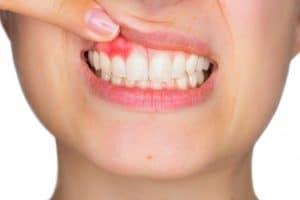 Almost half of all Americans will experience advanced gum disease, called periodontitis, during adulthood, and most people will experience some form of it during their lifetime. While this may make periodontal disease sound normal, dental health issues should never be normalized, and can lead to other issues that can affect your whole body. In today’s blog, your Conroe, TX, dentist will discuss the recently discovered link between gum disease and a higher stroke risk, and what you can do to protect yourself against these issues.
Almost half of all Americans will experience advanced gum disease, called periodontitis, during adulthood, and most people will experience some form of it during their lifetime. While this may make periodontal disease sound normal, dental health issues should never be normalized, and can lead to other issues that can affect your whole body. In today’s blog, your Conroe, TX, dentist will discuss the recently discovered link between gum disease and a higher stroke risk, and what you can do to protect yourself against these issues.
What Is Gum Disease?
Periodontal disease begins in a stage called gingivitis, which is the only time that the disease can be reversed. It is caused by the bacteria infested plaque on your teeth which causes infection in your gums. It is usually painless, so many people do not know they have it until it has already advanced. However, at your checkups and cleanings, your dentist will be able to examine your mouth for signs of gingivitis or its more advanced forms, helping you to catch it as soon as possible, before it becomes a larger issue.
What Are the Warning Signs?
Warning signs of gum disease include:
- Bleeding gums
- Red or swollen gums
- Tender gums
- Gums pulling away from your teeth
- Teeth becoming loose or shifting in your mouth
- Persistent bad breath
What Is the Link to Stroke?
A recent study has found that when your gums are inflamed and bleed, it changes the way that oxygen and blood flows to your brain. While research is still being conducted, it is speculated that this change can double a person’s risk for stroke. This is not something we should ignore, as research is also constantly being done on possible links between gum disease and other conditions such as diabetes and heart disease. We also already know that periodontal disease is one of the main causes of tooth loss in adults, which means that you should always take care to watch for any signs of the disease so that you can contact your dentist right away if you notice anything strange.
How to Prevent It
The good news is that, since gingivitis starts with plaque, you can help keep yourself free from periodontal disease and its associated risks by carefully maintaining good oral hygiene practices. Simply brushing your teeth thoroughly two times a day and flossing thoroughly at least once a day should be enough to reduce or even eradicate most of the plaque on your teeth. However, it is always recommended to attend professional dental cleanings at least every six months to make sure that your smile stays as clean as possible and so that your dentist can examine your mouth for any warning signs of disease.
Schedule Your Next Appointment Today!
If you are exhibiting any warning signs of gum disease, or if you are due for a cleaning and checkup, contact the Dental Centre of Conroe to schedule a visit by calling (936) 441-4600. We serve patients from Conroe, TX, and the neighboring communities.


